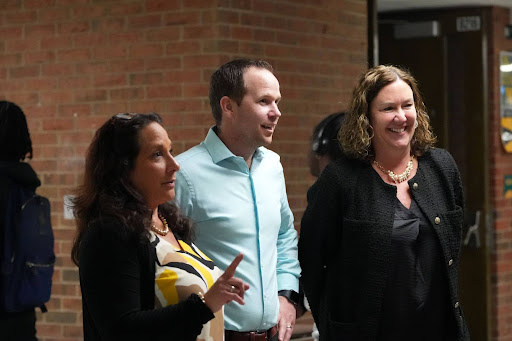ACT scores at an all time low: Largest decline of math scores 31 years

Photo credit: Elly Meteer
December 1, 2022
The national average ACT score in 2022 reached a record low of 19.8, which is the first time since 1991 when the average fell to below 20 out of 36. Nationally, the math section experienced the biggest drop, however, according to the Oct. 14 School Pointes, this does not apply to GPPSS. Despite this, there are still concerns regarding the cause behind the national decline in scores.
Rather than in-class education driving the decline, changes in the number of participants are suspected to have taken part in impacting the averages, according to testing coordinator Matthew Paulun. Paulun noted that this year the SAT has more participants compared to the ACT.
“I’ve noticed between ACT and SAT that more people are actually signed up for the SAT now,” Paulun said. “Right now there are usually around 300 kids signed up for the SAT [at North] and there are only usually 60 signed up for the ACT [at North].”
In addition to the decline in ACT test takers, math teacher Erica Thacker says the pandemic may have contributed to the notable decline of ACT math scores.
“We have to consider the effects that the pandemic and learning outside of the school space had on students,” Thacker said. “There are bound to be gaps of things that didn’t happen as fluidly or as smoothly as they would have occurred in a traditional school year.”
Teachers’ direct involvement in their students’ learning is something that Thacker believes is important. She says that they should be providing feedback and guidance for students.
“Teachers have to be cognizant of where gaps of learning could have taken place,” Thacker said. “It is important to communicate that with students as well.”
A form of student feedback that senior Olivia Dodenhoff utilizes is using her first ACT scores to create a roadmap for what she needs to review before her next attempt.
“I went into my first ACT without studying or preparing myself in order to show what I needed to improve on,” Dodenhoff said. “My scores revealed my strengths and weaknesses, allowing me to focus my studies on the areas I had a more difficult time with.”
Even with the decline in ACT scores, Thacker states that scores could eventually climb their way back up with hard work from both teachers and students.
“I am optimistic that we will see a positive trend in the data,” Thacker said. “But I am realistic in the sense that [improvements] might take some time [and] keeping in mind of what those gaps of learning are. I think that having these dips in our data and in our performance has really forced us to look at how can we then fix this trend.”
I am optimistic that we will see a positive trend in the data,” Thacker said. “But I am realistic in the sense that [improvements] might take some time [and] keeping in mind of what those gaps of learning are. I think that having these dips in our data and in our performance has really forced us to look at how can we then fix this trend.
— Erica Thacker









